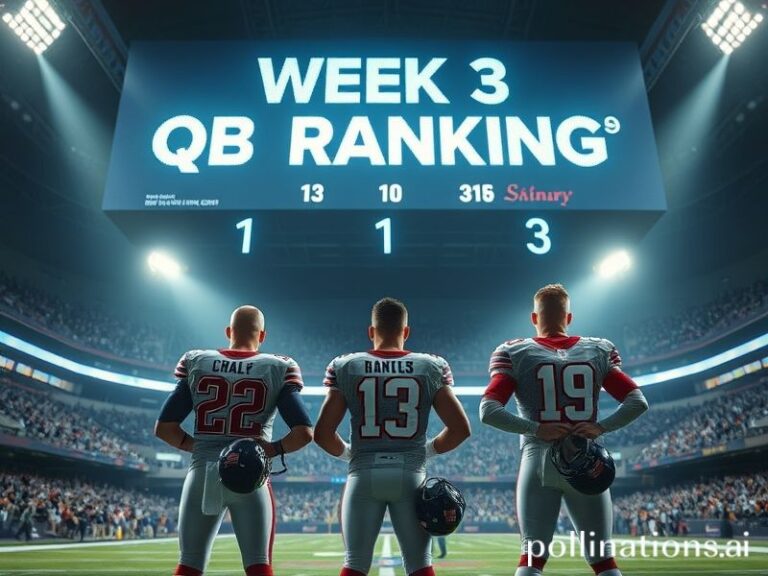Cade Stover: The Ohio Linebacker Accidentally Steering Global Geopolitics
Cade Stover: The Linebacker Who Could Stop a Trade War—But Probably Won’t
By Dave’s International Bureau of Mild Disillusionment
In the grand theater of global affairs—where nuclear submarines prowl, TikTok negotiates sovereignty, and the Euro flirts with parity like a drunk tourist in Mykonos—one Ohio State linebacker has emerged as an unlikely barometer of our fractured planet. His name is Cade Stover. He weighs 250 pounds, runs a 4.6 forty, and could, in theory, single-handedly derail a supply chain if he hit a container ship hard enough. Yet the true marvel isn’t the hit; it’s the fact that the world is now watching him like he’s the last functioning ATM in Buenos Aires.
Let’s zoom out. While BRICS nations debate de-dollarization over samovars and caipirinhas, the NFL quietly exports American soft power in shoulder pads. Stover, freshly drafted by the Houston Texans, is the latest shipment. He arrives at a moment when U.S. corn, microchips, and scripted reality television are all considered strategic reserves. In other words, a wholesome farm kid from Mansfield, Ohio, is now a data point in the IMF’s next quarterly outlook. If that doesn’t make you question the algorithms that run your life, congratulations—you’re already in the metaverse.
Europe, of course, pretends not to care. The continent that gifted us both Kant and the concept of the 35-hour workweek feigns indifference to American football. Yet L’Équipe still ran a half-page photo of Stover hurdling a Purdue tight end with the caption “Le Choc du Midwest.” Translation: even the French recognize brute elegance when they see it, especially when their own rugby team just lost to Italy. Meanwhile, Chinese streaming platforms bid for preseason rights, calculating that if 1.4 billion people watch one Texans game, Xi Jinping can finally stop worrying about Evergrande.
Back in the States, Stover’s backstory reads like apple-pie propaganda: fifth-generation farmer, raised on 300 acres of soy and moral certainty. He once missed a playoff game to help calve a stuck heifer—an anecdote so corny it could pollinate Iowa. But the global lens renders it surreal. While Argentine farmers torch their fields in protest of 143% inflation, Stover’s agrarian virtue is packaged as aspirational content for Indian agri-start-ups. Somewhere a Bangalore teenager wearing a counterfeit Texans jersey googles “how to grow soybeans in monsoon season.” He will fail, but the venture capital will flow anyway.
The strategic implications are deliciously absurd. Football scouts compare Stover to George Kittle with a vendetta; defense contractors compare him to a mobile howitzer with eligibility remaining. Lockheed Martin has reportedly run simulations on what happens if you give such a man exoskeletal leg braces and a Green Beret playbook. The Pentagon denies everything, which means the prototypes are already in a Nevada hangar next to the UFOs.
And then there’s the betting angle. Macau’s junket brokers now list “Stover total tackles” futures alongside Hong Kong real-estate volatility indices. London hedge funds are shorting the over, arguing that global interest-rate hikes will depress discretionary tackle enthusiasm. If that sentence makes sense to you, seek help—or a Bloomberg terminal.
Naturally, Stover himself remains oblivious to the geopolitical cargo he carries. Asked by a reporter whether he felt pressure representing American heartland values abroad, he replied, “I just like hitting people legally.” Somewhere, Henry Kissinger nods in grudging approval.
Conclusion: In a world where supply chains snap like cheap guitar strings and every commodity doubles as a bargaining chip, Cade Stover is the rare export that still feels analog. He won’t fix inflation, reconcile WTO disputes, or stop oligarchs from laundering money through European football clubs. But for three hours every Sunday, he offers a simpler narrative: a man, a ball, and the fleeting illusion that collisions have clear winners. Should the planet implode tomorrow, archaeologists will unearth his highlight reel and assume we all died happy. They will, of course, be mistaken—but the footage will loop beautifully in whatever museum replaces civilization.







